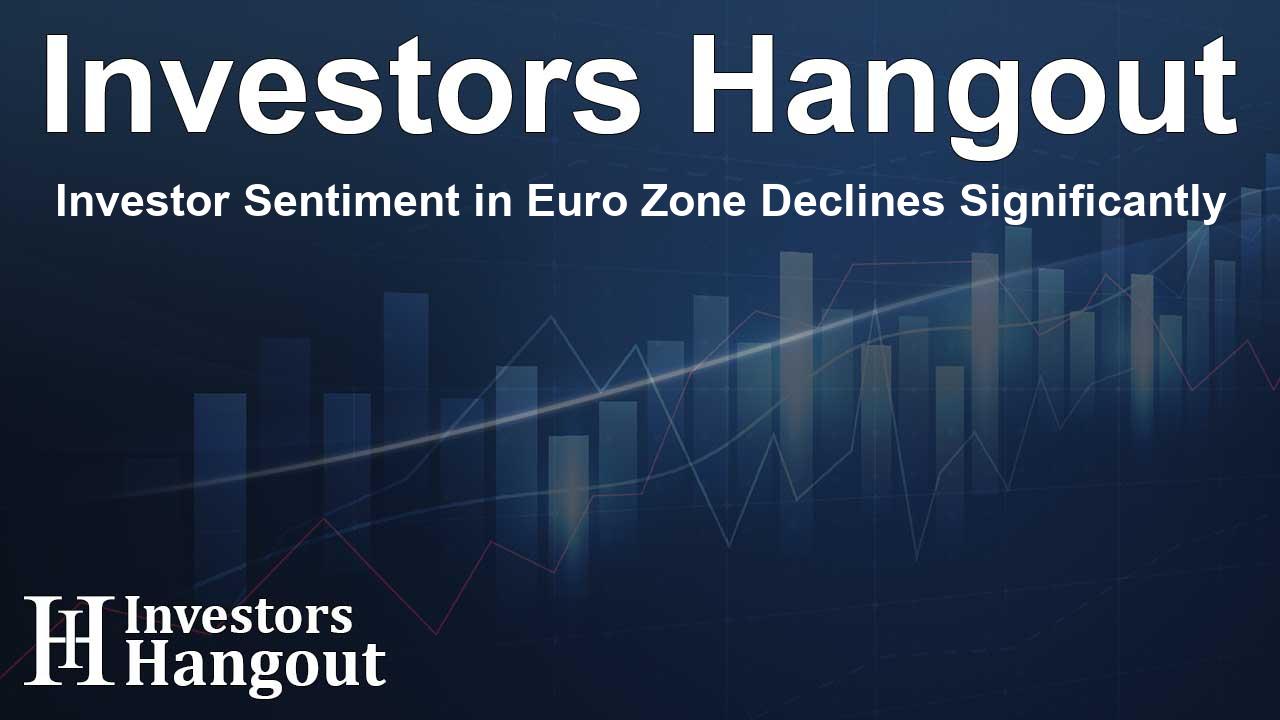Investor Sentiment in Euro Zone Declines Significantly

Decline in Euro Zone Investor Sentiment
Recent surveys reveal that investor morale in the euro zone has reached its lowest point in over a year. This sharp decline reflects ongoing economic challenges, notably the persistent recession in Germany, which casts a shadow over the entire region.
Sentix Index Insights
The Sentix index, a key measure of investor sentiment in the euro zone, dropped to -17.7 in January. This marks a slight decrease from the previous month's -17.5 but is notably better than analysts' predictions of a steeper decline to -18.0. The index suggests that investors are grappling with an uncertain economic outlook.
Investor Responses and Future Expectations
A survey conducted among 1,121 investors at the beginning of January highlighted growing concerns about the euro zone's economic trajectory. Although expectations for future performance saw a minor improvement, rising from -5.8 to -5.0, this was overshadowed by a deteriorating perception of the current situation, which fell to -29.5.
Evolving Economic Landscape
The euro zone economy concluded 2024 in a precarious state, having experienced a contraction in overall activity during December. While the services sector managed to display a modest recovery, it was insufficient to counterbalance the significant downturn in manufacturing. As the economy remains cautious, the final composite Purchasing Managers' Index (PMI) for December increased slightly to 49.6, remaining below the 50 mark that indicates growth.
PMI Insights and Sector Performance
Driving this slight uptick was a rebound in the services sector's PMI, which climbed to 51.6, up from 49.5 in November. However, the manufacturing sector faced continued challenges. Economists, like Cyrus de la Rubia from Hamburg Commercial Bank, commented on the fragile foundation for future growth in the services sector, despite recent data suggesting a less vibrant business environment.
Labor Market Resilience Amidst Struggles
Recent research from the European Central Bank reveals that while the labor market in the euro zone has demonstrated remarkable resilience, this strength may not last. Despite an overall stagnation in economic activity, the area maintains a historically low unemployment rate of 6.3%. Firms continue to hire, albeit cautiously, as potential slowing factors loom ahead.
Employment Trends and Economic Correlation
The ECB highlights a noteworthy phenomenon: employment rates have outpaced real GDP growth since 2022. This trend, contrary to historical standards, is likely a result of firms maintaining a larger workforce due to high profit margins, allowing them to weather lower revenue periods. However, with real wages aligning more closely to historical patterns and energy prices stabilizing, a shift in this labor dynamic could be imminent, returning labor markets closer to their historical correlations with output.
Conclusion
Investor morale in the euro zone illustrates the delicate balancing act economic agents are facing. The interplay between a resilient but potentially fading labor market, along with moderating growth expectations, paints a complex picture for the future. Stakeholders will need to remain vigilant as these factors continue to evolve.
Frequently Asked Questions
What does the Sentix index indicate?
The Sentix index is a measure that reflects investor sentiment in the euro zone, indicating current and future economic expectations.
Why is Germany's economy a focus in the euro zone?
Germany's recession greatly affects the euro zone's overall economic performance, as it is one of the region's largest economies.
How did the PMI perform in December?
The PMI for the euro zone rose slightly to 49.6 in December, signaling ongoing contraction but showing a modest improvement from the previous month.
Is the euro zone labor market still strong?
While the labor market appears resilient, it may face challenges ahead as factors contributing to recent strength begin to diminish.
What are the future expectations for the euro zone economy?
Future expectations remain uncertain, with slight improvements in sentiment overshadowed by a negative outlook on the current economic situation.
About The Author
Contact Henry Turner privately here. Or send an email with ATTN: Henry Turner as the subject to contact@investorshangout.com.
About Investors Hangout
Investors Hangout is a leading online stock forum for financial discussion and learning, offering a wide range of free tools and resources. It draws in traders of all levels, who exchange market knowledge, investigate trading tactics, and keep an eye on industry developments in real time. Featuring financial articles, stock message boards, quotes, charts, company profiles, and live news updates. Through cooperative learning and a wealth of informational resources, it helps users from novices creating their first portfolios to experts honing their techniques. Join Investors Hangout today: https://investorshangout.com/
The content of this article is based on factual, publicly available information and does not represent legal, financial, or investment advice. Investors Hangout does not offer financial advice, and the author is not a licensed financial advisor. Consult a qualified advisor before making any financial or investment decisions based on this article. This article should not be considered advice to purchase, sell, or hold any securities or other investments. If any of the material provided here is inaccurate, please contact us for corrections.
